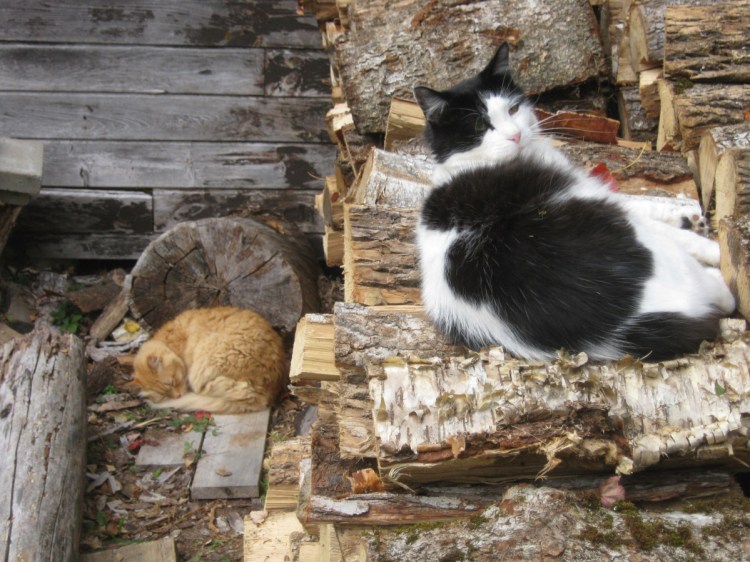We have at our house two of the roughly 600 million house cats inhabiting Earth now. How they got among us is kind of interesting. Felis catus in general, I mean, not just Brian and Panda.
It turns out cats more or less domesticated themselves. Wildcats, known to scientists as Felis silvestris, have been around for at least 5.3 million years. About 10,000 years ago, humans in the Middle East invented farming. Soon rats and other pests that wreck crops and housing and carry disease were attracted to the food sources, and wildcats followed them to the farms, where they befriended the humans.
It’s thought that all house cats are descended from the wildcat subspecies Felis silvestris lybica in the Middle East. The remains of a cat and a human were found side by side some years ago in a 9,500-year-old grave on Cyprus, suggesting to the archaeologists that the two were buried together as companions. This was thousands of years before the ancient Egyptians were depicting cats with reverence in their painting and sculpture.
Domestic Felis catus spread east and west, and it’s believed that like humans, cats may have arrived in North America over the Bering land bridge (though they can’t have been Felis catus, because the land bridge was under water by 10,000 years ago). Domesticated cats most likely arrived in the vicinity of Maine with the Vikings in the 11th century. Whether they had attached themselves to native peoples before that is apparently not speculated upon — so far, at least. Centuries after the Vikings, other Euro-settlers brought them along, too. Naturally, like everybody else, cats have developed their own evolutionary characteristics, and sometime between the Vikings and the Victorians (it is believed) short-haired cats native to these parts mated with long-haired cats brought by Vikings, and others, and gave rise to what’s known as the Maine coon cat.
Our cat Brian appears to be descended from coon cats. He has a big mane of orange and white fur, huge paws, strong-looking shoulders, and the wide, dreamy face of the Maitreya Buddha. He shakes his paws and flees open doors when he detects temperature lower than about 45 F, and he has no use for anything wet that is falling out of the sky.
Cats have a lovable, angelic side, which cat lovers love; and they have a demonic side, which cat haters hate. At our house we like them because they’re funny, affectionate, cheerful, beautiful, and vigilant (when they feel like it) against the rodents who, 10,000 years later, are still threats to house, health and electrical wiring. But cats are also cold-blooded murderers, who can be cruel, snotty, finicky and vindictive. They kill too many birds (though not around our house), and in some places feral cats are an out-and-out eco-problem. They’re on the Global Invasive Species Database list of 100 of the World’s Worst Invasive Alien Species, though it’s hard to figure out how, after 5.3 million years, they could still be invading.
Whether more birds have been killed by cats or by poison effluents from planes and automobiles is probably debatable. But cats are not genetic engineering experiments gone awry. They have been sharing the world with us for about 10,000 years, not only keeping the riffraff at bay, but also intersecting deeply with our inner lives.
Just ask the hospice workers who some years ago paid special reverence to their facility’s cat. The cat always knew which bed to curl up on — the one of the person who would die that day. The hospice workers loved the cat for providing emotional comfort to the suffering. This looks for all the world like profoundly moral activity. Whatever its origins, we live in it together.
Dana Wilde lives in Troy. You can contact him at naturalist1@dwildepress.net. His recent book is “Summer to Fall: Notes and Numina from the Maine Woods.” Backyard Naturalist appears the second and fourth Thursdays each month.
Send questions/comments to the editors.



Comments are no longer available on this story